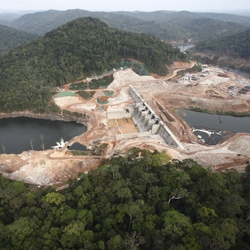Klohn Crippen Berger Receives the 2010 Canadian Consulting Engineering Award of Excellence

Vancouver, Canada, October 28, 2010 --(PR.com)-- A distinguished jury of professional engineers from business, government and academia have honoured Canadian engineering firm, Klohn Crippen Berger (KCB) for their work on the Nam Theun 2 Hydroelectric Project (NT2) in Laos.
The NT2 project is a long-term collaborative effort between Laos and Thailand to develop up to 3000 MW of hydropower energy in Laos for export to Thailand. KCB participated in the NT2 project as the designer for the two main civil works packages comprising the hydro facilities. The NT2 project is one of the most important infrastructure developments in the country and a key driver supporting growth and advancement of Laos and its people.
The Nam Theun River, a major tributary of the Mekong River, is situated on the Nakai plateau between the Mekong River and the Annamite Mountains delineating the eastern border of Laos with Vietnam. The project required the water to be diverted from the Nam Theun River to a powerhouse located at the base of the Nakai escarpment and from there to Mekong.
This river experiences a large annual flood event which proved a challenge for the Design-Build Constructor. Rather than incurring significant costs to divert the flood waters, KCB recommended an innovative flood handling plan using a small diversion tunnel and roller- compacted concrete construction (RCC). The RCC construction was done during the dry season windows over three years with the site area being flooded during the wet seasons.
The project’s underground works are large in scale and complex in design. This is especially true for the pressure shaft and tunnels that divert the water. To manage the flow, KCB designed one of the largest pressure-diameter bifurcations (tunnels) in the world. In order to handle the load and rock stresses, KCB’s design required the use of high strength steels of thicknesses that would not normally be seen on hydroelectric projects. This set a precedent for the use of steel types and thicknesses in the hydro industry.
The benefits of the project are many: economically, the people of the area will now have access to inexpensive electricity and have a resource for export; socially, the surrounding areas benefitted from the schools, community buildings, roads, houses and jobs that were developed in the project area; and a Poverty Reduction Fund is being implemented by Laos and the World bank with direct funding from the NT2 energy revenues. A substantial portion of the revenues will flow back to Laos and the NT2 will contribute annual revenues equal to 7 to 9% of Lao national budget or a total of $2billion USD over the 25 year concession period.
Klohn Crippen Berger offers global engineering and environmental services to the mining, power, transportation, oil sands, offshore and pipeline and water resource sectors worldwide. KCB was named one of Canada’s 50 Best Managed Companies in 2009.
###
The NT2 project is a long-term collaborative effort between Laos and Thailand to develop up to 3000 MW of hydropower energy in Laos for export to Thailand. KCB participated in the NT2 project as the designer for the two main civil works packages comprising the hydro facilities. The NT2 project is one of the most important infrastructure developments in the country and a key driver supporting growth and advancement of Laos and its people.
The Nam Theun River, a major tributary of the Mekong River, is situated on the Nakai plateau between the Mekong River and the Annamite Mountains delineating the eastern border of Laos with Vietnam. The project required the water to be diverted from the Nam Theun River to a powerhouse located at the base of the Nakai escarpment and from there to Mekong.
This river experiences a large annual flood event which proved a challenge for the Design-Build Constructor. Rather than incurring significant costs to divert the flood waters, KCB recommended an innovative flood handling plan using a small diversion tunnel and roller- compacted concrete construction (RCC). The RCC construction was done during the dry season windows over three years with the site area being flooded during the wet seasons.
The project’s underground works are large in scale and complex in design. This is especially true for the pressure shaft and tunnels that divert the water. To manage the flow, KCB designed one of the largest pressure-diameter bifurcations (tunnels) in the world. In order to handle the load and rock stresses, KCB’s design required the use of high strength steels of thicknesses that would not normally be seen on hydroelectric projects. This set a precedent for the use of steel types and thicknesses in the hydro industry.
The benefits of the project are many: economically, the people of the area will now have access to inexpensive electricity and have a resource for export; socially, the surrounding areas benefitted from the schools, community buildings, roads, houses and jobs that were developed in the project area; and a Poverty Reduction Fund is being implemented by Laos and the World bank with direct funding from the NT2 energy revenues. A substantial portion of the revenues will flow back to Laos and the NT2 will contribute annual revenues equal to 7 to 9% of Lao national budget or a total of $2billion USD over the 25 year concession period.
Klohn Crippen Berger offers global engineering and environmental services to the mining, power, transportation, oil sands, offshore and pipeline and water resource sectors worldwide. KCB was named one of Canada’s 50 Best Managed Companies in 2009.
###
Contact
Klohn Crippen Berger
Kathy Fowler
604.669.3800
www.klohn.com
Kathy Fowler
604.669.3800
www.klohn.com
Categories
